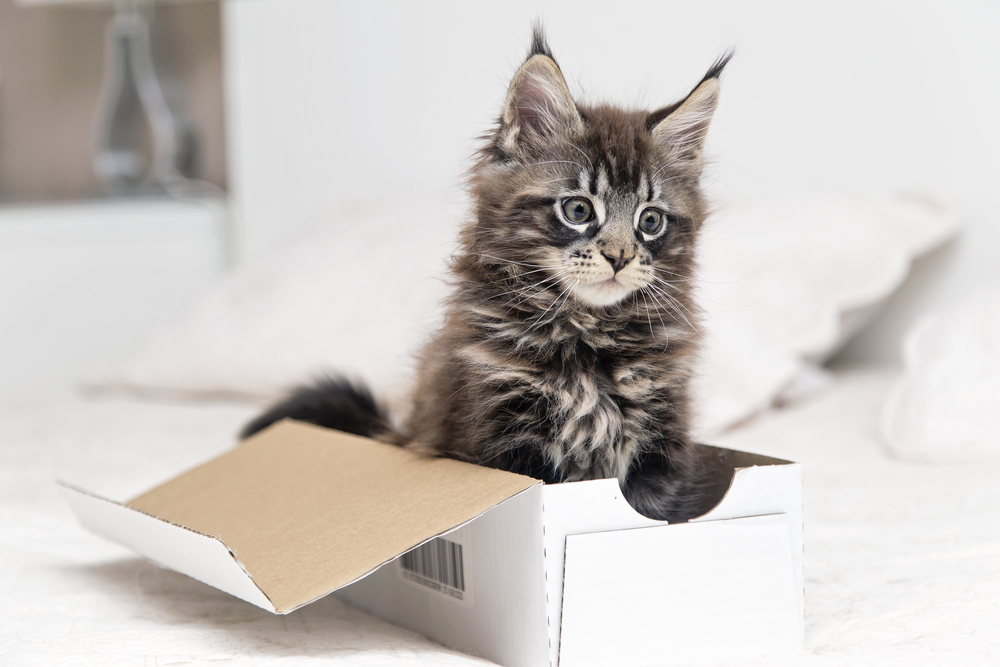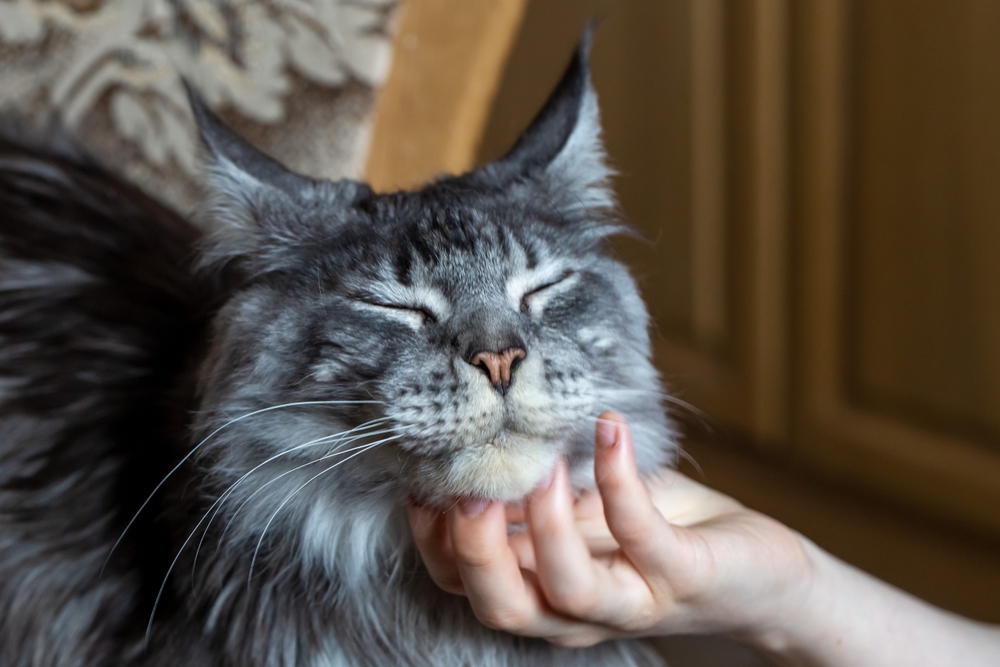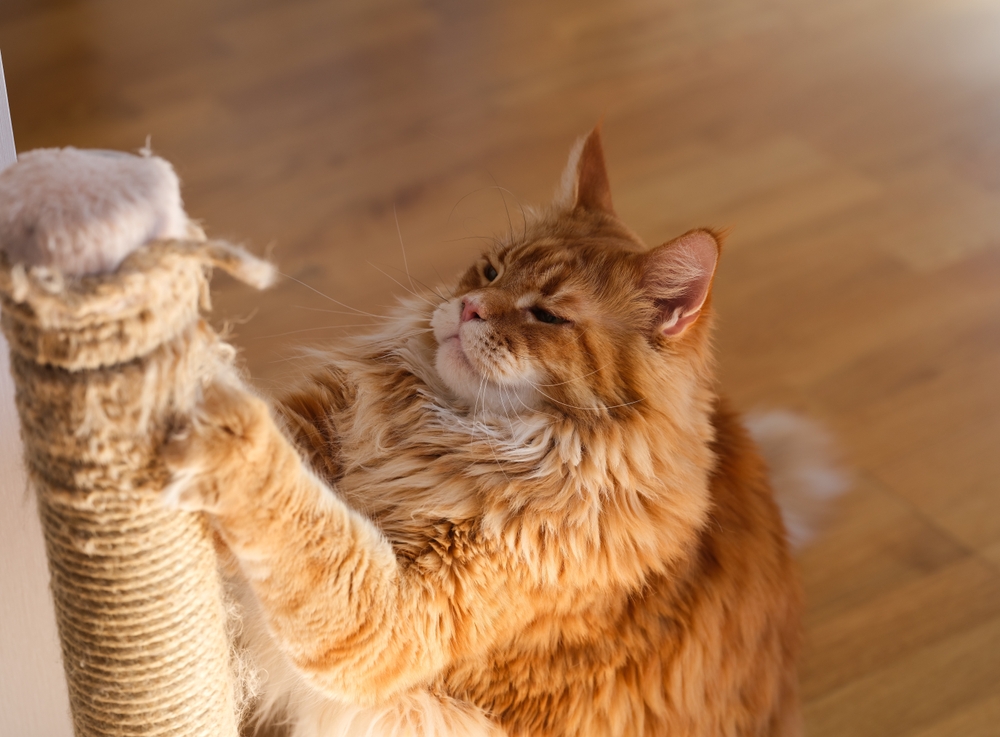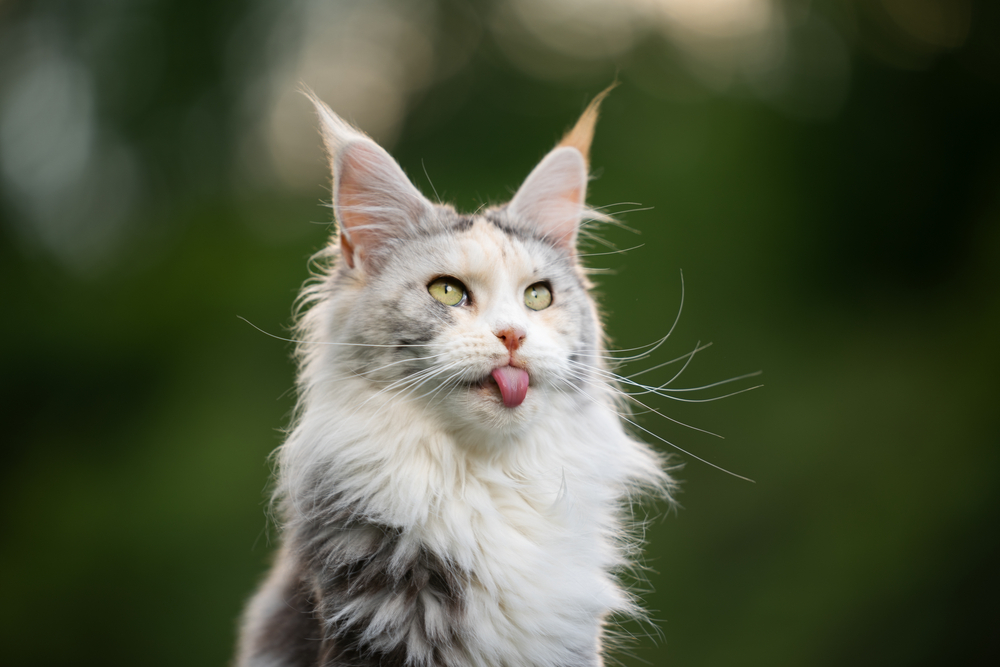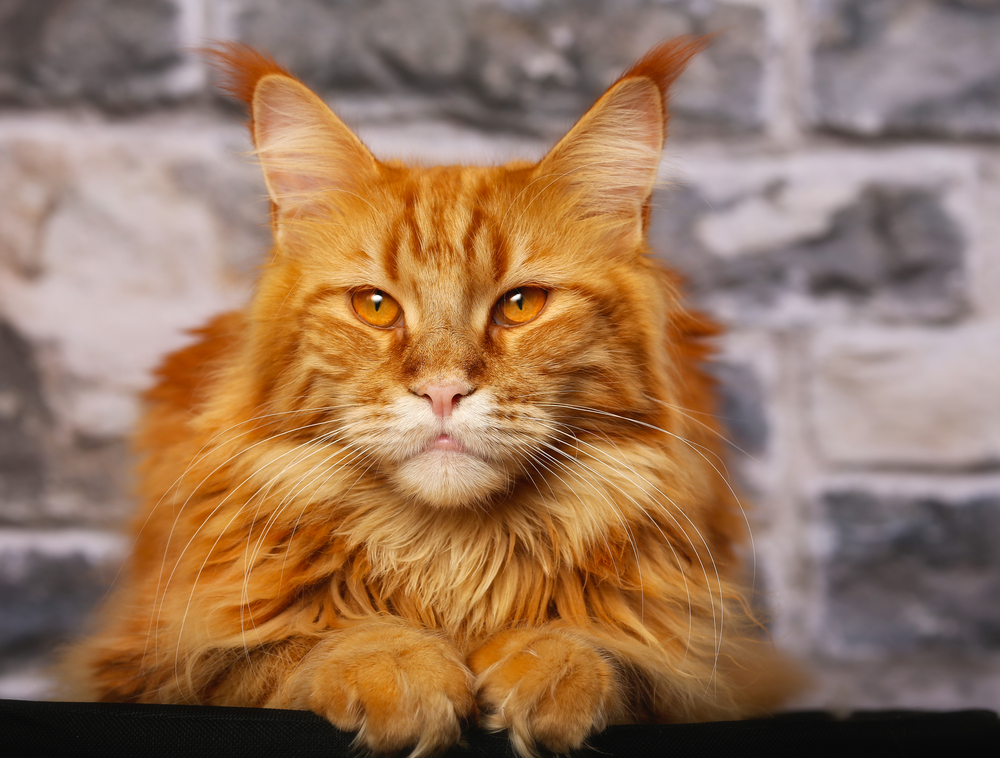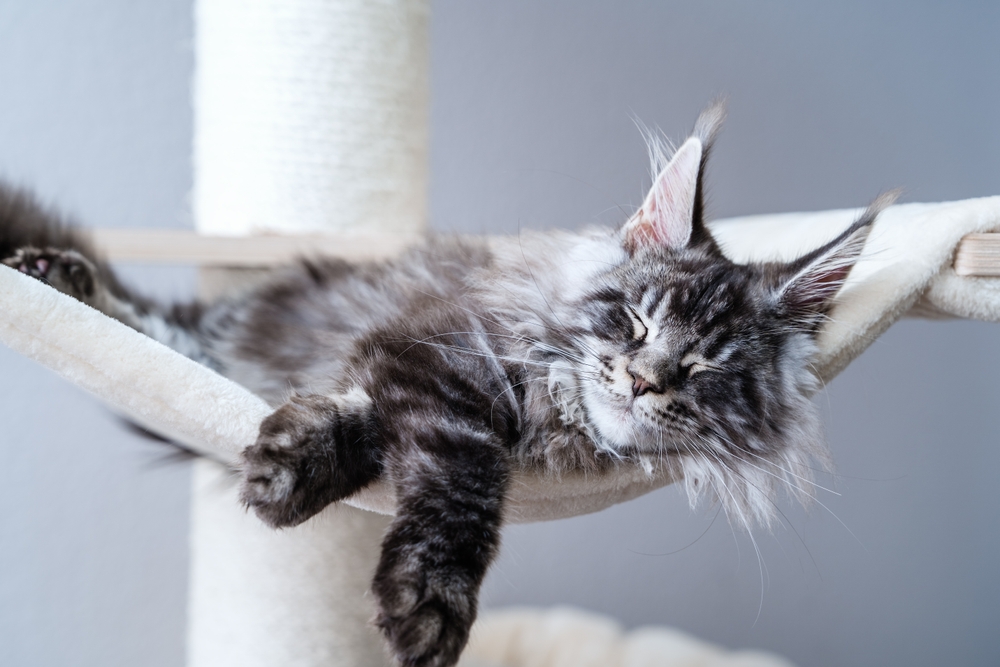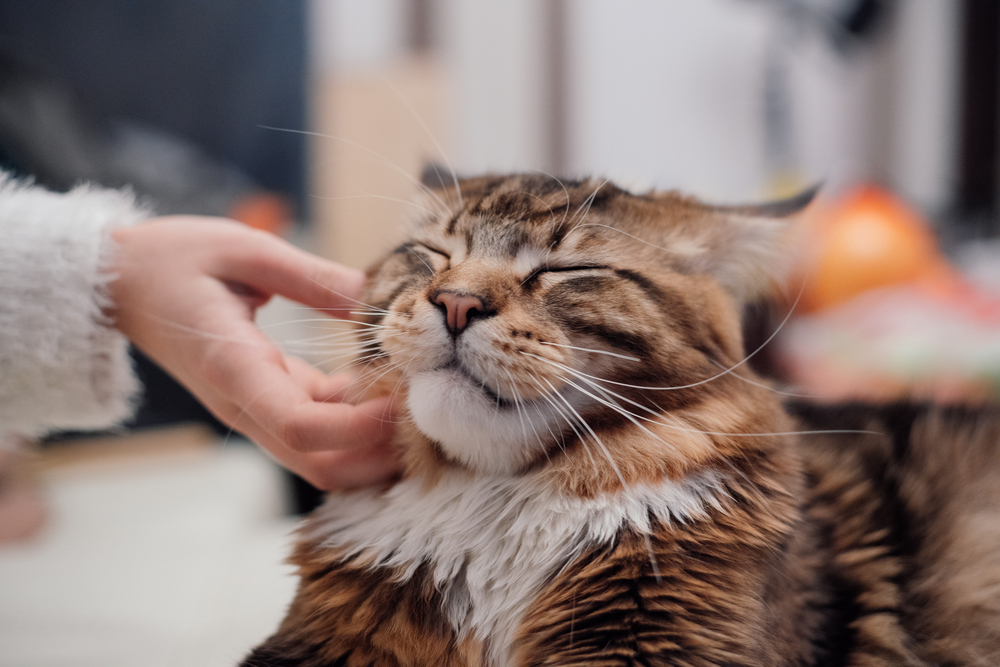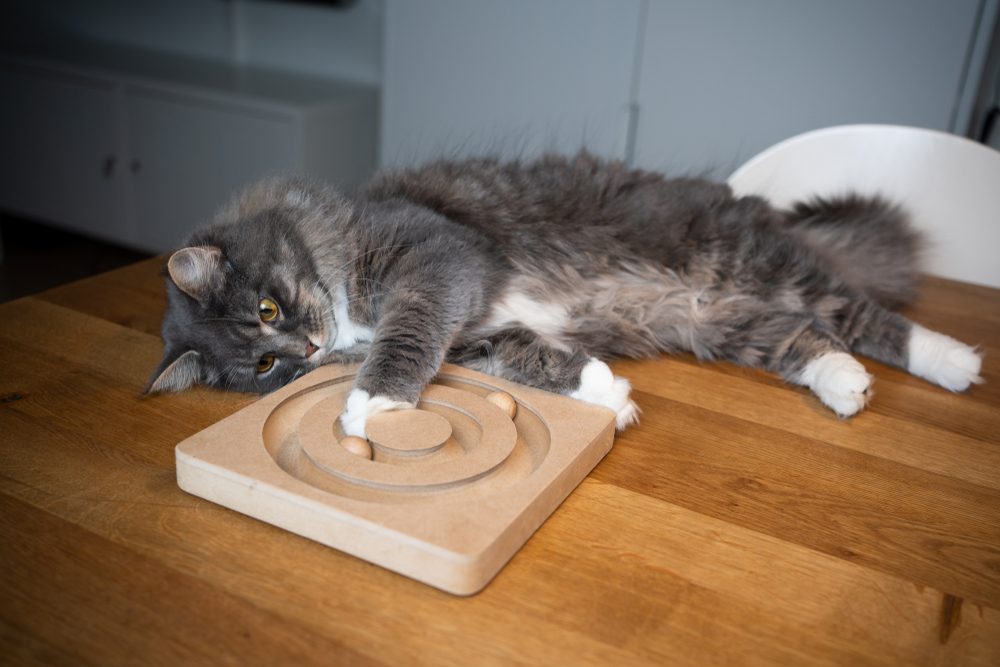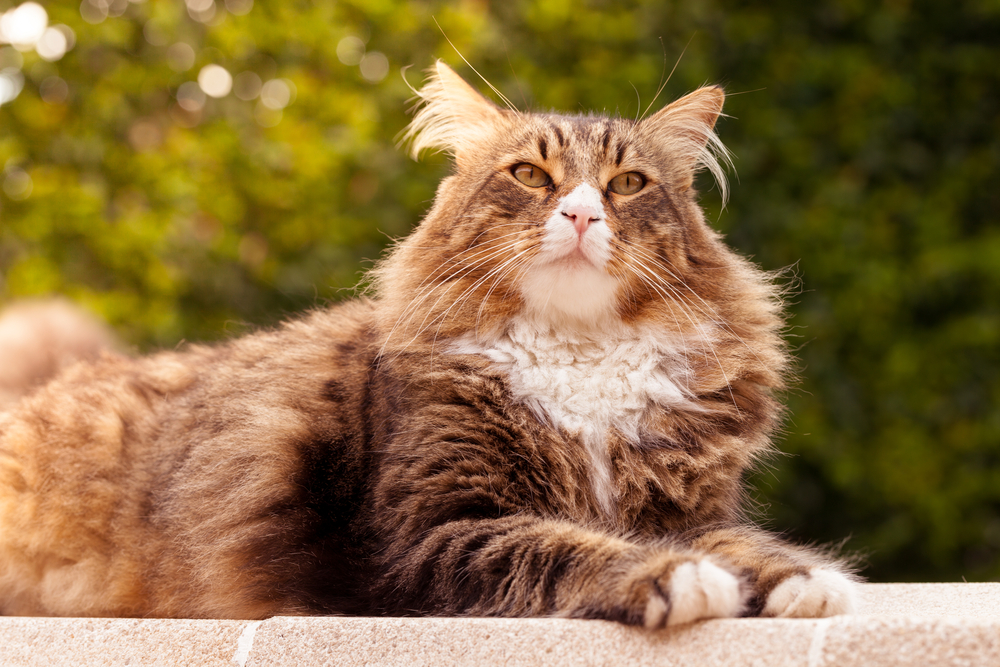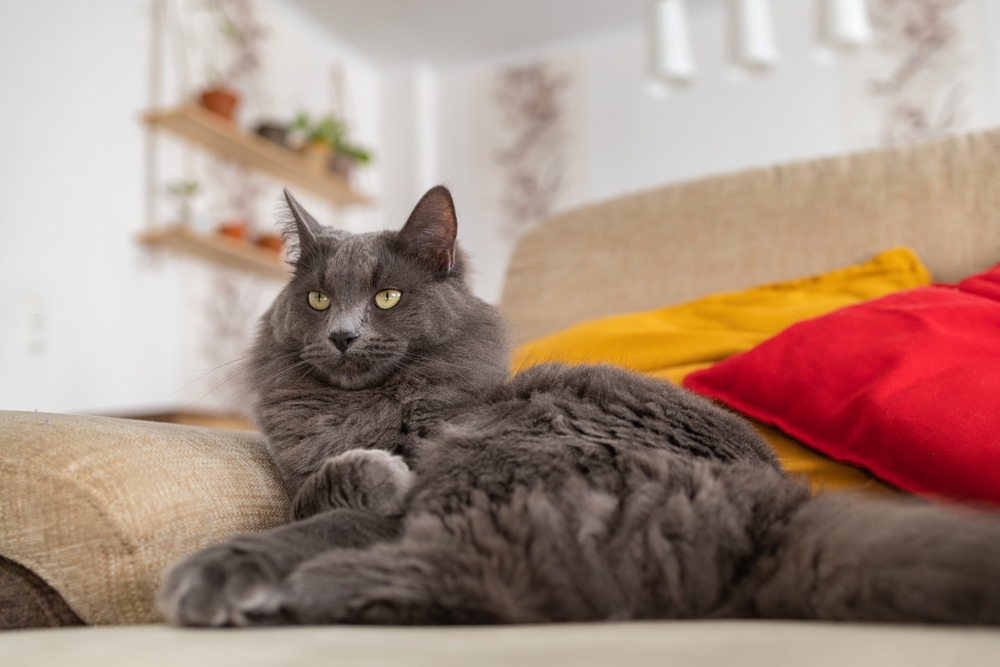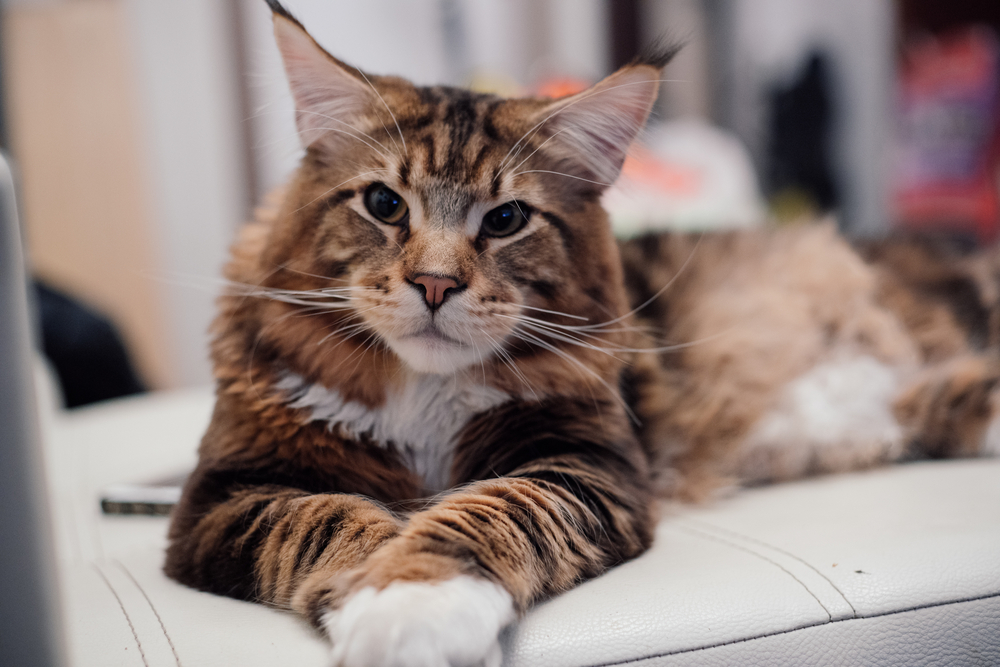📖 Table of Content:
Maine Coon cats are native to the state of Maine and are considered the oldest native cat breed in the U.S. Scruffy, shaggy, and rugged, these boisterous beasts represent one of the most popular, prominent cat breeds out there that managed to take over the world after facing extinction at one point.
Maine Coons, or gentle giants of the cat world, make for purrfect pets for a million reasons. Whether you’re on the hunt for a four-legged friend to spend your Friday nights with or a curious creature to explore the great outdoors with, a Coon’s the right way to go.
Coons are curious creatures with massive, muscular bodies, fluffy, flowy coats with more than 60 color combinations and patterns, perked-up ears topped with whips of fur, and eye-catching physical features that attract attention. Big cats with even bigger purrsonalities, Coons are a sight for sore eyes.
Maine Coons aren’t all looks, though. Coons are affectionate and appreciative, and they’re more than happy to hang out with humans, nap the day away, and nibble on tasty treats. Coons are family-friendly, too, and they’re great for people with plenty of friends and family members that adore big cats.
Whatever your preferences might be, we’re positive that a Maine Coon kitten would bring more meaning to your life than you might think. Coons are incredibly intelligent and intimidating, but they’re everything a pet parent might want and more – they’re deemed dogs of the cat world, too.
We’re bringing you a rundown on everything you need to know about Maine Coon cats before you bite the bullet and get your hands on one. What’s the history behind the Maine Coon cat? What’s there to know about these felines? What are you waiting for? Read more down below!
What’s the history behind the Maine Coon cat?
Now we’re talking! Maine Coon cats are surrounded by mystery and that’s because we don’t know when or where these fashionable felines came from. We know that Maine Coons are native to the state of Maine, but we don’t know who or what brought them there. Worry not, though, we’ve got the tea.
When referring to the origin of the Maine Coon cat, most cat connoisseurs agree on three theories. First off, there’s a theory that Maine Coon cats came to be as a cross between a raccoon and a cat. We agree that the raccoon theory makes quite a compelling case, but that’s simply not biologically possible.
Furthermore, we can’t forget about the theory that Maine Coons are descendants of Marie Antoinette’s Turkish Angora cats. What does Marie Antoinette have to do with Maine Coons? We know that Maine Coons descended from cats brought to the U.S. by ship, right?
Marie Antoinette might have had something to do with that. When Marie was set to flee France out of fear of prosecution, she packed up her bags and her beloved Turkish Angora cats and sent them on a ship by the name of Sally.
Sally belonged to a shipping company based in Wiscasset, Maine, USA, and traveled between Maine and France. Marie Antoinette was beheaded before Sally set sail, but the Turkish Angora cats successfully reached Maine, mated with local cats, and created scruffy, shaggy kittens deemed Maine Coons.
Finally, the endmost theory suggests that an English seafarer named Charles Coon brought an army of Turkish Angora cats, Persian cats, and breeds with long, luscious coats on deck while sailing around the world. Coon was known to allow the cats to roam around, mate with local cats, and wreak havoc.
What’s there to know about the Maine Coon cat?
Now that we’ve gone above and beyond trying to understand the origin of everyone’s favorite breed, we need to unpack the dos and don’ts of caring for a Maine Coon cat. Maine Coons are the opposite of high maintenance, but does that mean that you can get away with not doing anything? Nope!
Maine Coon cats, like all cats, adore attention and affection. Coons are the happiest when they’re taken care of, emotionally, mentally, and physically. Caring for a Coon means spending quality time together, cuddling, grooming each other, and even feeding each other – Coons don’t mind sharing.
When you do your research, you’re going to notice that you’re much more ready to take on the task of bringing a Maine Coon kitten home. Whether you’re planning on becoming a Coon parent or you’ve already brought the bundle of cuddles home, we’ve got you covered.
Appearance
Starting with appearance, we do need to underline that Maine Coon cats grow big. When you get a Maine Coon kitten, chances are you’re going to notice that the cutie appears bigger than a regular kitten – but you might think that she’s not going to grow bigger than an average cat.
Maine Coon cats are one of the biggest breeds out there, and they’re known to weigh between 15 and 25 pounds and measure about 20 to 40 inches long and 10 to 16 inches tall.
When compared to average cats that weigh between 5 and 10 pounds and measure about 20 to 28 inches long and 9 to 10 inches tall, they’re massive. When you add the fluffy, flowy fur on top of that, you get a cat that resembles a freakin’ lion – and we’re here for that.
Brown Maine Coon cats are the most popular, prominent ones, and they’re the most lion-like, but Maine Coons can sport a myriad of different color combinations and patterns, too.
Between black, white, cream, red, and blue colors and tabby, bi-color, parti-color, tortoiseshell, shaded, and calico patterns, there are 64 color combinations you can count on when you’re shopping for the purrfect Coon to go with your current cat collection. We’re kidding, we’re kidding.
But we’re not kidding about the fact that Maine Coon cats are everyone’s cup of tea. With muscular, rectangular bodies, puffed-up chests, perked-up ears with whisps of fur peeking out ever-so-slightly, expressive almond-shaped eyes, and lengthy, bushy tails, what’s not to adore?
Read more:
Siberian Maine Coon Mix – A Match Made In Heaven Or Hell?
Black Smoke Maine Coon: The Truth About This Majestic Cat
Tuxedo Maine Coon: The Mysterious 007 Of Cats
Grey Maine Coon: Everything You Need To Know And More
Savannah Maine Coon Mix: Are You Looking For A Giant?
Orange Maine Coon: All About These Beautiful Giants
Maine Coon Ragdoll Mix: What’s There To Know?
Russian Blue Maine Coon Mix: The Purrfect Combination
Silver Maine Coon: The Purrfect Salt-And-Pepper-Haired Pet
Personality
Oh, there’s never a dull moment with a Maine Coon cat! When you glance at a Maine Coon, you might be taken aback by the considerable measurements or the structured, angular face and think “Wow, that’s a scary kitty!”
While Maine Coon cats are reminiscent of bobcats, they’re far from wild. Maine Coons are one of the most affectionate breeds out there and that’s what makes everyone fall for them. Coons are cute, cuddly, and nurturing toward humans.
When you get your hands on a Maine Coon cat, know that she wants to be a part of the family. Whether that means you take your Coon with you everywhere you go, spend quality time with her, or get her to hang out with your friends and family, that’s up to you.
But Coons are the happiest and healthiest when they’re a part of everything you do. We’d argue that they’re pretty clingy, too, considering they’re known to follow you from room to room or watch you shower.
Before you get your hopes up, we do need to underline that Coons aren’t lap cats – they’re too big for that. They’re more than happy to nap next to you, but they’re not big on getting picked up and carried around. They’re independent even though they’re addicted to attention.
Of course, Maine Coons are incredibly intelligent, highly trainable, and playful, too. They’re excited to explore the great outdoors, walk on a leash, play fetch, and learn tricks. They’re in need of mental and physical stimulation, and they’re known to keep their kittenish playfulness well into old age.
Maine Coons aren’t aggressive, quite on the contrary. They’re patient with humans who don’t understand boundaries and pick them up without consent. They’re great with children, too.
Care
Maine Coon cats are pretty straightforward – feed them, groom them, make sure they’re physically active on a regular, and shower them with affection and they’re going to adore the ground you walk on. We’d argue that Maine Coons are the opposite of high maintenance, but that’s up to you to decide.
When caring for a Maine Coon cat, you need to keep an eye on a few things. First things first, Coons are embellished with big, bold, beautiful coats that require grooming and brushing on a regular. Weekly brushing and monthly bathing should do the trick, but every Coon’s different.
We suggest brushing them every day when they’re going through the shedding season to ensure you’re getting rid of the extra weight. Weekly brushing should be enough otherwise, but don’t shy away from brushing them more often when you notice they’re getting matted.
Matted coats can cause a myriad of problems and that’s why you’re better off brushing them whenever you get the chance. Maine Coons don’t mind getting groomed and brushed – quite on the contrary, your Coon might even start purring.
Monthly bathing should keep your Coon clean, but we encourage you to get some soap and water the moment that you notice your Coon’s coat getting greasy or stringy. Moreover, physical activity plays a huge part when we’re talking about caring for a Maine Coon cat.
Coons adore napping, nibbling on treats, and watching TV, but that’s not something you want them doing every moment of the waking hour. Climbing on the cat tree, hopping on the counters, and playing with cat toys come with the territory – you get extra points when you spend time with them outside, too.
Read more: Maine Coon Whiskers: Everything About Their Crucial Feature
Needs
Whether you rescue a cat off the street or purchase a red pedigree cat, you must provide them with a happy home, a warm bed to sleep on, and a Fancy Feast to munch on. Maine Coons aren’t much different from any animal you’d consider taking care of, but we’re going to give you a rundown on what to focus on.
First and foremost, Coons need an affectionate family with plenty of time to spare – Coons aren’t big on spending time alone and they’re known to become depressed when they’re abandoned for hours and hours every day. Working parents might want to consider getting them a friend to play with.
We suggest spending quality time with your Coon, whatever that might mean for you. Rather than coming home from work and watching TV for the rest of the day, you might want to make an effort to entertain your cat, take her out on a walk, or shower her with smooches.
Furthermore, Maine Coons aren’t solitary animals, and that’s another thing to keep an eye on.
Coons can be alone for a few hours every day (when you’re at work or running errands), but they’re known to get frustrated when that becomes the norm. Get your Coon another cat to spend time with or take her to the puppy park to meet a BFF.
Arrange a play date with your neighbor’s cat or get a catsitter when you know you’re going to work a long shift. Coons are expressive, and we’re positive you’re going to get a concert of chirps and trills every time you leave your Coon alone.
Diet and nutrition
Maine Coons, like all cats, are carnivores. Carnivores evolved to thrive on animal protein and animal fat, and that’s exactly what you’re supposed to feed your Maine Coon to ensure she’s taken care of nutritionally.
Animal protein and animal fat give her the energy to keep on hunting, roaming around the apartment, and climbing on cat trees. Meat and fish are the best way to go about providing your Coon with these two things.
Chicken, turkey, beef, salmon, tuna, mackerel, and prawns – whichever source of protein and fat you opt for, you’re guaranteed to keep your Coon on her toes every time you bring out a bag of Purina or a can of Fancy Feast.
Whether you opt for wet food, dry food, raw food, or homemade food, make sure you’re keeping the emphasis on protein and fat and you’re good to go. Cats are notoriously bad at hydrating and you might need to add water or broth to your cat’s bowl when you’re feeding her.
Water fountains are great, too, because Maine Coon cats are obsessed with water that moves and they’re more likely to drink out of a water fountain than a water bowl.
Health
A cat’s health depends on an array of factors, from nutrition and physical activity to quality of life, regular vet checkups, and genetics. And although we’re not at liberty to predict whether your Coon’s going to reach a ripe age of 15 years without a health niggle, we can argue that Coons are a healthy bunch.
Breeders oftentimes breed cats with health problems because they’re more concerned with appearance and whether or not the breed’s going to get them money, but Coons aren’t burdened with that. Coons are typically healthy pets that reach a whopping 12 to 15 years of age when taken care of.
Common health concerns that plague Maine Coon cats are connected to how humungous these gentle giants are. Coons typically suffer from diseases such as arthritis or hip dysplasia because of the added weight.
Because of that, Maine Coons need to maintain a healthy weight, exercise, and eat healthy foods. Moreover, Coons are known to suffer from hypertrophic cardiomyopathy (HCM) – but that’s the most commonly diagnosed cardiac disease in cats.
We do need to mention that Coons don’t come with the best teeth and they’re known to develop dental disease, too. With regular veterinarian checkups and screening, there’s no reason why you wouldn’t be able to keep your Coon’s health under control.
Price
We gotta talk numbers, right? More often than not, cats with a pedigree cost more than your monthly rent, but they’re worth the money when you know you got them from a reputable breeder. When referring to average prices, we do need to consider a few things.
Number one, breeders are much more expensive than animal shelters and rescues. When buying a Maine Coon cat from a breeder, you’re going to spend anywhere between $800 and $2,000, depending on the breeder – the more reputable the breeder is, the more money you’re going to spend.
When adopting a Maine Coon cat, on the other hand, you’re going to spend anywhere between $100 and $400, but you’re going to have a harder time finding a Maine Coon cat in a shelter or a rescue.
Number two, kittens cost more than grown cats and that’s something you might want to consider, too.
Number three, you’re going to spend much more money on cat care and supplies than you are on the cat. Veterinarian checkups, vaccinations, and spaying/neutering are going to break the bank, but a litter box, a cat bed, a cat carrier, a brush, a cat tree, toys, bowls, and food are going to cost even more.
5 fun facts about Maine Coon cats guaranteed to seal the deal
With that out of the way, we do need to underline that Maine Coons are worth your effort and energy. Maine Coon cats are sweethearts, and that’s why they’re deserving of a family that’s going to spoil them rotten. When you’re ready to cross the Rubicon, check out these 5 fun facts about Maine Coon cats!
1. Maine Coon cats are waterproof
Cats and water don’t go together, but Maine Coon cats don’t care about that. Maine Coons are equipped with waterproof fur, but they’re more cooperative at bath time than the average feline, too.
Whether that’s because of the fur or because of something we’re overlooking, Maine Coon cats seem to have a love/hate relationship with water. They’re great with water fountains and they’re excited to drink out of a faucet.
They’re obsessed with watching you shower and pawing at your bath when you’re trying to have a pamper session. They’re great swimmers, too, but we suggest getting them accustomed to water from a young age rather than expecting them to swim out of the blue.
2. Coons carry the gene for extra toes
We’re obsessed with cats with big, fluffy paws, and we were over the moon when we found out that Maine Coons carry the gene for extra toes. With a few extra toes, they’re even bigger and fluffier!
An average cat typically comes with five toes on each of the front paws and four on each of the back. A Maine Coon cat with a polydactyl gene, on the other hand, can be born with six or more toes on each paw, front or back.
Cat connoisseurs believe that Coons might be susceptible to the polydactyl gene to be able to pad through snow, catch mice, and run around on ships better than an average cat.
3. A Maine Coon cat was successfully cloned
Maine Coon cats might not be strangers to controversy, after all. A Maine Coon cat by the name of Little Nicky went down in history as the first known cloned pet.
A woman from Texas, devastated by the death of her beloved Coon, decided to offer $50,000 to a California-based biotech company to clone her dead cat. Despite the controversy, the woman didn’t regret a thing considering that Little Nicky was identical to the original Nicky.
4. Coons are Guinness World Record holders
Coons are known for their massive, muscular bodies and lengthy, and bushy tails. Maine Coon cats beat out other breeds when competing for the World Record for the biggest cat because these features make them 3 to 4 feet long.
According to the Guinness World Records, the biggest cat ever was a Maine Coon named Mymains Stewart Gilligan, a.k.a. Stewie. Although Stewie passed away a few years back, the biggest cat alive is also a Maine Coon. Barivel, a Maine Coon cat from Vigevano, Italy, is the current record holder.
Read more: Munchkin Maine Coon: Mini Version Of Your Majestic Fluff
5. A Maine Coon cat was the star of a Harry Potter film
Guinness World Record holders, successfully cloned, Hollywood stars – we’re not surprised that you’re thinking of getting a Maine Coon cat. We can’t forget that a Maine Coon cat was a star of a Harry Potter film – a scrawny, shaggy kitty roaming the halls of Hogwarts, Mrs. Norris, was a brown tabby Maine Coon.
We hope we sealed the deal for you!
